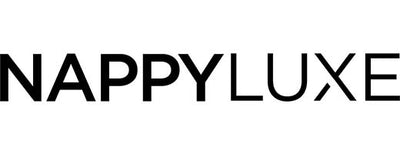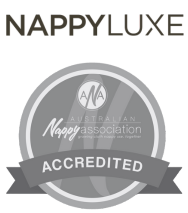7 Reasons To Use Struckets [What They Are & How They Work]

Here are our top 7 reasons we’ve found the strucket - strainer and bucket combined - to be an ideal tool to use alongside cloth nappies.
What is a strucket, exactly, I hear you ask.
It’s a great laundry tool that is effectively a strainer and bucket combined.
The beauty is in the interlocking connection which allows the strainer to elevate above the bucket. The design was created by Australian mum of 3, Kelly Lavery.
Struckets are Australian made, using hard-wearing plastic that is free from the harmful chemical BPA, meaning that it’s safe for you and your family to use.
It is 100% recyclable and can handle anything from boiling water, bleach, and more.
Many cloth nappy families are starting to use struckets to store their dirty cloth nappies, and here’s why:
1. Strucket is a dry pail and soaking solution combined
Those who have read our cloth nappy washing guide will know that we recommend dry pailing dirty cloth nappies.
Dry pailing means placing your modern cloth nappies in an airy basket to allow good airflow to ventilate the nappies and prevent bad smells from forming.
The strucket allows you to use it as a dry pail by clipping the inner strainer to the side of the bucket part, allowing plenty of airflow around the nappies.
Whilst your day-to-day care of your nappies doesn’t involve soaking them, there are still occasions where you may need to soak.
This might be if your wash routine has gone awry and you need to do a sanitise on your nappies.
Or, it could be that a nappy insert has a particularly stubborn stain that needs to soak in some stain removal solution.
Or it could just be that you have a new baby in the house, where poonami’s, vomits, and mess requires a constant need to soak clothing.
Either way, having a strainer and bucket combo is a win-win.
2. Struckets protect your home surfaces
Some cloth nappy parents choose to use a wire basket for their dry pail.
Whilst this works well to provide good ventilation around the nappies, it does mean finding something to protect the surface underneath.
For those wanting to place their dry pail basket in a carpeted room, placing something between the carpet and the dirty nappies is essential to keep nasty liquids from touching the carpet.
With the strucket providing a handy clip to elevate the strainer/dry pail above the bucket, any surface underneath is well protected from liquids dripping down.
You can also add some essential oil like lavender to the base for a pleasant fragrance.
3. Struckets are adaptable for your home layout
Those in a small apartment may find that a single change table setup next to the laundry in the home works for them, in which case a single 19L strucket is ideal.
However, those with larger homes spread across different levels may find life easier to have a few change areas, to save constant trips up and down the stairs.
In this instance, we’ve found having a few of the mini struckets stationed at each change area works well, with the large strucket in the laundry room.
This means that at the end of the day, nappies can be collated from the various changing stations into the main dry pail in the laundry room.
4. Struckets can be used for other things too
One of the things we love most about the strucket is its multiple other uses.
The nappy wearing years don’t last forever, and when your child is out of nappies, it’s ideal having tools like the strucket that can be easily repurposed.
As your child grows into a small human, there’s always a need to soak clothing, whether it’s messy food, toilet-training accidents, or muddy football kit.
When you’re ready to make the switch to reusable sanitary pads or menstrual cups, the strucket can be used to clean these too.
The strucket can even be used out of the home for anything from a portable drinks cooler, a fish catching container, or mini sink while camping.
5. The strucket won’t rust
For those who choose to use a wire basket as a dry pail, the downside here is that these can start to rust over time.
The moisture from the dirty nappies, combined with airflow, provides the perfect recipe for rust to form.
The strucket is made from BPA free plastic that will never rust, and it will ultimately last a lifetime if cared for properly.
6. Strucket can be used as a laundry sink if you don’t have one
Not everyone has the benefit of having a laundry sink to dedicate to keeping cloth nappies clean.
Whilst laundry sinks are popular here in Australia, in many other countries, it isn’t the norm to have a laundry sink in the home.
For these people, the strucket provides the perfect makeshift laundry sink.
In this instance, we recommend having a bidet sprayer installed at the toilet and using this as the laundry tap to rinse off the dirty nappies in the strucket.
Dirty water can then be disposed of in the toilet.
7. The strucket looks good too.
We couldn’t help but include this as our final reason: we just love how good the strucket looks in the home.
There aren’t many nappy dry pails that look aesthetically pleasing on the eye, but with natural colours and a soft shape, the strucket does just this.
The fact that the strucket was an Australian Good Design Award Winner, shows just how useful the product is for households across the Nation.
These are the top reasons we recommend strucket to our customers who are starting out with cloth nappies.
Meet the Author
Natalie Lassen

Natalie, Founder of NappyLuxe, is an eco-conscious mother and entrepreneur who discovered the benefits of cloth nappies for her family and the environment. With a mission to create the ultimate cloth nappy, she spent years researching and testing various designs before launching NappyLuxe - a range of high-quality, easy-to-use, and ultra-absorbent cloth nappies. Natalie is passionate about sharing her experience and expertise, helping parents make informed decisions and embark on their own sustainable parenting journey.
Blog posts
How To Use Wool Nappy Covers At Night (Benefits & Wash guide)
Best Cloth Nappies Australia [What Features Do Top Brands Have In Common]
The 5 Top Uses For Cloth Wipes Revealed
Get 10% off your first order
Plus get notified about promotions, new releases and journal updates.





















